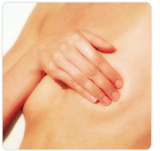
Many women find that combination hormone therapies, such as estrogen plus progesterone, are some of the most effective ways to treat menopausal symptoms. However the little research which has been carried out on estrogen-based hormone therapies has pointed to some possibly dangerous side effects with this type of treatment. Breast cancer is obviously a growing risk to women as they age and at menopause when estrogen levels are uncontrollable. Recent research into the possibilities of a link between estrogen treatments, breast tenderness and breast cancer show some interesting results.
In a trail set up by the Women's Health Initiative women who were taking estrogen plus progesterone treatments were give yearly mammograms and clinical breast examinations by researchers while self-accessed breast tenderness was also noted annually. All the women who took part had intact uteri and while some were given 0.625mg of estrogen plus 2.5mg of medroxprogesterone acetate others were given a placebo. Cases of breast cancer were also recorded and considered after an average of 5.6 years during the trail. This was so that breast cancer risk could be calibrated at the end of the research.

Results showed that women who were not suffering from breast tenderness at the start of the trail and out of those who were given estrogen plus progesterone as a treatment instead of the placebo, did in fact suffer from increased breast tenderness after the first year of treatment. Doctors also noted that the risk of breast cancer was also significantly higher in this group of women than those who were not experiencing increased breast tenderness with the same treatment. Women in the placebo group, not taking estrogen plus progesterone, were also found to be at less of a risk from breast cancer even with increased breast tenderness which was simply due to menopause.
As this research demonstrates, breast cancer risk is dramatically increased when breast tenderness comes as a side effect of estrogen based hormone treatments. This research is positive as it highlights the need for post menopausal women to be extra vigilant in listening to their own bodies during treatment which contain foreign estrogens. However it is also clear that breast cancer risk may be cut all together if estrogen based hormone treatments are not used by menopausal or post menopausal women. In this case other, non-estrogen based, treatments need to be further developed.